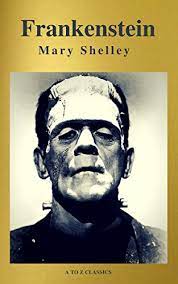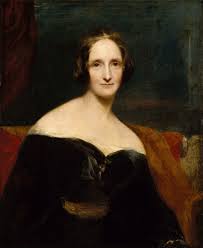Frankenstein Page #7
Frankenstein; or, The Modern Prometheus is an 1818 novel written by English author Mary Shelley. Frankenstein tells the story of Victor Frankenstein, a young scientist who creates a sapient creature in an unorthodox scientific experiment
On the birth of a second son, my junior by seven years, my parents gave up entirely their wandering life and fixed themselves in their native country. We possessed a house in Geneva, and a campagne on Belrive, the eastern shore of the lake, at the distance of rather more than a league from the city. We resided principally in the latter, and the lives of my parents were passed in considerable seclusion. It was my temper to avoid a crowd and to attach myself fervently to a few. I was indifferent, therefore, to my school-fellows in general; but I united myself in the bonds of the closest friendship to one among them. Henry Clerval was the son of a merchant of Geneva. He was a boy of singular talent and fancy. He loved enterprise, hardship, and even danger for its own sake. He was deeply read in books of chivalry and romance. He composed heroic songs and began to write many a tale of enchantment and knightly adventure. He tried to make us act plays and to enter into masquerades, in which the characters were drawn from the heroes of Roncesvalles, of the Round Table of King Arthur, and the chivalrous train who shed their blood to redeem the holy sepulchre from the hands of the infidels. No human being could have passed a happier childhood than myself. My parents were possessed by the very spirit of kindness and indulgence. We felt that they were not the tyrants to rule our lot according to their caprice, but the agents and creators of all the many delights which we enjoyed. When I mingled with other families I distinctly discerned how peculiarly fortunate my lot was, and gratitude assisted the development of filial love. My temper was sometimes violent, and my passions vehement; but by some law in my temperature they were turned not towards childish pursuits but to an eager desire to learn, and not to learn all things indiscriminately. I confess that neither the structure of languages, nor the code of governments, nor the politics of various states possessed attractions for me. It was the secrets of heaven and earth that I desired to learn; and whether it was the outward substance of things or the inner spirit of nature and the mysterious soul of man that occupied me, still my inquiries were directed to the metaphysical, or in its highest sense, the physical secrets of the world. Meanwhile Clerval occupied himself, so to speak, with the moral relations of things. The busy stage of life, the virtues of heroes, and the actions of men were his theme; and his hope and his dream was to become one among those whose names are recorded in story as the gallant and adventurous benefactors of our species. The saintly soul of Elizabeth shone like a shrine-dedicated lamp in our peaceful home. Her sympathy was ours; her smile, her soft voice, the sweet glance of her celestial eyes, were ever there to bless and animate us. She was the living spirit of love to soften and attract; I might have become sullen in my study, rough through the ardour of my nature, but that she was there to subdue me to a semblance of her own gentleness. And Clerval—could aught ill entrench on the noble spirit of Clerval? Yet he might not have been so perfectly humane, so thoughtful in his generosity, so full of kindness and tenderness amidst his passion for adventurous exploit, had she not unfolded to him the real loveliness of beneficence and made the doing good the end and aim of his soaring ambition. I feel exquisite pleasure in dwelling on the recollections of childhood, before misfortune had tainted my mind and changed its bright visions of extensive usefulness into gloomy and narrow reflections upon self. Besides, in drawing the picture of my early days, I also record those events which led, by insensible steps, to my after tale of misery, for when I would account to myself for the birth of that passion which afterwards ruled my destiny I find it arise, like a mountain river, from ignoble and almost forgotten sources; but, swelling as it proceeded, it became the torrent which, in its course, has swept away all my hopes and joys. Natural philosophy is the genius that has regulated my fate; I desire, therefore, in this narration, to state those facts which led to my predilection for that science. When I was thirteen years of age we all went on a party of pleasure to the baths near Thonon; the inclemency of the weather obliged us to remain a day confined to the inn. In this house I chanced to find a volume of the works of Cornelius Agrippa. I opened it with apathy; the theory which he attempts to demonstrate and the wonderful facts which he relates soon changed this feeling into enthusiasm. A new light seemed to dawn upon my mind, and bounding with joy, I communicated my discovery to my father. My father looked carelessly at the title page of my book and said, “Ah! Cornelius Agrippa! My dear Victor, do not waste your time upon this; it is sad trash.” If, instead of this remark, my father had taken the pains to explain to me that the principles of Agrippa had been entirely exploded and that a modern system of science had been introduced which possessed much greater powers than the ancient, because the powers of the latter were chimerical, while those of the former were real and practical, under such circumstances I should certainly have thrown Agrippa aside and have contented my imagination, warmed as it was, by returning with greater ardour to my former studies. It is even possible that the train of my ideas would never have received the fatal impulse that led to my ruin. But the cursory glance my father had taken of my volume by no means assured me that he was acquainted with its contents, and I continued to read with the greatest avidity. When I returned home my first care was to procure the whole works of this author, and afterwards of Paracelsus and Albertus Magnus. I read and studied the wild fancies of these writers with delight; they appeared to me treasures known to few besides myself. I have described myself as always having been imbued with a fervent longing to penetrate the secrets of nature. In spite of the intense labour and wonderful discoveries of modern philosophers, I always came from my studies discontented and unsatisfied. Sir Isaac Newton is said to have avowed that he felt like a child picking up shells beside the great and unexplored ocean of truth. Those of his successors in each branch of natural philosophy with whom I was acquainted appeared even to my boy’s apprehensions as tyros engaged in the same pursuit.
Translation
Translate and read this book in other languages:
Select another language:
- - Select -
- 简体中文 (Chinese - Simplified)
- 繁體中文 (Chinese - Traditional)
- Español (Spanish)
- Esperanto (Esperanto)
- 日本語 (Japanese)
- Português (Portuguese)
- Deutsch (German)
- العربية (Arabic)
- Français (French)
- Русский (Russian)
- ಕನ್ನಡ (Kannada)
- 한국어 (Korean)
- עברית (Hebrew)
- Gaeilge (Irish)
- Українська (Ukrainian)
- اردو (Urdu)
- Magyar (Hungarian)
- मानक हिन्दी (Hindi)
- Indonesia (Indonesian)
- Italiano (Italian)
- தமிழ் (Tamil)
- Türkçe (Turkish)
- తెలుగు (Telugu)
- ภาษาไทย (Thai)
- Tiếng Việt (Vietnamese)
- Čeština (Czech)
- Polski (Polish)
- Bahasa Indonesia (Indonesian)
- Românește (Romanian)
- Nederlands (Dutch)
- Ελληνικά (Greek)
- Latinum (Latin)
- Svenska (Swedish)
- Dansk (Danish)
- Suomi (Finnish)
- فارسی (Persian)
- ייִדיש (Yiddish)
- հայերեն (Armenian)
- Norsk (Norwegian)
- English (English)
Citation
Use the citation below to add this book to your bibliography:
Style:MLAChicagoAPA
"Frankenstein Books." Literature.com. STANDS4 LLC, 2025. Web. 21 Jan. 2025. <https://www.literature.com/book/frankenstein_1446>.




Discuss this Frankenstein book with the community:
Report Comment
We're doing our best to make sure our content is useful, accurate and safe.
If by any chance you spot an inappropriate comment while navigating through our website please use this form to let us know, and we'll take care of it shortly.
Attachment
You need to be logged in to favorite.
Log In